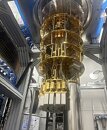
HPE Expands ProLiant Gen12 Server Portfolio With 5th Gen AMD EPYC Processors
HPE today announced an expansion to the HPE ProLiant Compute Gen12 server portfolio, which delivers next-level security, performance and efficiency. The expanded portfolio includes two new servers powered by 5th Gen AMD EPYC processors to optimize memory-intensive workloads, and new automation features for greater visibility and control delivered through HPE Compute Ops Management.
In addition, HPE ProLiant Compute servers are now available with HPE Morpheus VM Essentials Software support. HPE Morpheus VM Essentials is an open virtualization solution that helps reduce costs, minimize vendor lock-in, and simplify IT management. HPE also announced new HPE for Azure Local solutions with the HPE ProLiant DL145 Gen11 server to empower expansion of purpose-built edge capabilities across distributed environments.
In addition, HPE ProLiant Compute servers are now available with HPE Morpheus VM Essentials Software support. HPE Morpheus VM Essentials is an open virtualization solution that helps reduce costs, minimize vendor lock-in, and simplify IT management. HPE also announced new HPE for Azure Local solutions with the HPE ProLiant DL145 Gen11 server to empower expansion of purpose-built edge capabilities across distributed environments.



















































